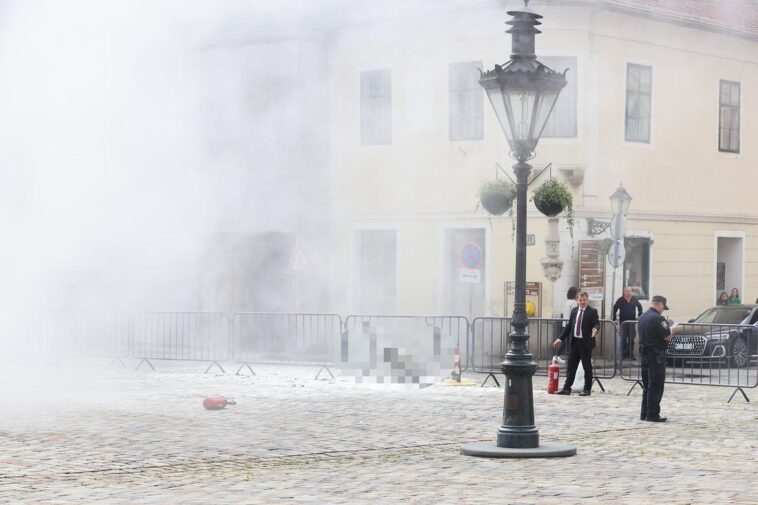Author: Ina Vukić
On June 12, 2024, a most horrifying suicide had occurred in front of the Government building on St Mark Square, Zagreb. The man (57) poured petrol on himself and set himself alight, soon after dying from severe burns in the Traumatology Clinic of Sisters of Mercy Hospital.
A most disgraceful behaviour by Croatian Parliament Medical Officer, Dr Gordana Stajmineg, followed almost immediately. Soon after the war veteran set himself alight and first aid helpers rushed to the scene Dr Gordana Stajmineg addressed the media saying that the incident was not due to any political reasons and that the man who set himself on fire was a failed gambler, who was reported by his wife last year and that he was mentally disturbed.
Such statement by anyone is simply awful but when it comes from a medical officer one must ask two questions: who employed such a disgrace of a medical doctor and who is still keeping her in employment after such unprofessional and obviously politically laced comments that would shield the government from any negative insinuation or accusation with regards to services for war veterans etc. and attack the very person who took his own life?
A week has passed, and apart from a handful of publicly known persons in Croatia condemning Dr Stajmineg’s public character assassination of the man who committed suicide, Prime Minister Andrej Plenkovic and Speaker of the Parliament Gordan Jandrokovic expressing condolences to his family Dr Stajmineg has not been sacked from her position as the Parliamentary medical officer on Croatian taxpayers’ coffers. What does that tell the world about the treatment of Croatian Homeland War veterans by official Croatia? What does that say about professionalism and regard for privacy of people by the Parliament’s own medical officer? Grave professional misconduct does not, evidently, ring alarm bells with government authorities every time in Croatia. Unforgiveable in my book!
Dr Stajmineg should not have been kept in the medical officer position in the Parliament, or anywhere where the taxpayer’s money goes towards salaries, but should have been immediately suspended from duties pending an investigation. That is what would happen in countries where rule of law prevails, and nepotism and shady recruitment practices have no place and respect for people’s privacy is observed, at least from official government sources.
Certainly, unless she has a magical crystal ball and can see into people’s minds with 20/20 vision Dr Stajmineg could not have possibly known that the suicide was not from political reasons. She had reportedly not known the man in question and certainly if by any chance she was privy to any medical report about him prior to rushing out of the parliament house addressing the present media with such awful statements about the man and his alleged mental health condition, she only had second and not first-hand information about him. And no diligent professional would take second-hand information as fact unless he/she had the opportunity to personally look into it. There, in the public place with the man having sustained terrible burn injuries and his life hanging in the balance Dr Stajmineg seriously breached every possible code of professional conduct and of duty of care, to name just two. And definitely the media had no right to know or be told of any details of the man’s mental health.
Regarding war veteran suicides around the world and suicides in general, it is useful here to remind oneself that at the turn of the 20th century, suicide was often regarded as a symptom of mental illness. Cases of suicide, if recorded at all, were almost always marked as being a case of “temporary insanity”. Due to the stigma, controversy and inflammatory nature of the topic, discussions surrounding mental health and suicide in the military and among veterans were limited for much of the 20th century. However, things improved noticeably after the Vietnam War for veteran health care and combat related psychological disorders. At the turn of the 21st century, both the military and governments in the Western countries that boast of high democratic and human rights respect values have come to recognise the issue of combat-related suicide and have gone about the business of building higher awareness and treatments for conflict and shellshock related psychological states.
As can be expected the Serbian media in Croatia and Bosnia and Herzegovina have published and re-published Dr Stajmineg’s description of the man who committed suicide in Zagreb. They, it appears, prefer to label him as a “failed gambler and mentally unstable” to addressing the possible horrors the same man may come across on the battlefields of defending Croatia from Serb aggression during 1990’s. And official Croatia has not, to my knowledge, moved a finger in publicly defending the honour of this most likely psychologically affected, shell shocked war veteran.
As the above case demonstrates, more and more media attention has been given to suicides, reporting on them in an opportunistic manner, on a case-by-case basis and, unfortunately, most often in a sensationalist manner. The number of suicides in the war veteran population Croatia has consistently been reported in the media as being alarmingly high, over 3500, and given the poorly released figures from government data the number of these suicides so far is estimated to be somewhere between 3500-4500, and probably more!
According to data from the Central health information system of the Republic of Croatia/ CEZIH system and the database on hospitalisations, in the year 2022, 30,342 Homeland War veterans were recorded in the Republic of Croatia who, due to post-traumatic stress disorder and permanent personality changes after catastrophic experiences on the battlefields, so-called. chronic post-traumatic stress disorder, used health care, among whom there were 29,498 men and 844 women. The numbers would revolve at similarly high levels in 2024.
It would appear that no significant positive and practical steps (apart from keeping scores or numbers on data bases) in consistent and constant public awareness building have occurred since the Veteran’s portal published the following in its article on government neglect of war veterans’ health in 2019: “It is necessary to carry out public health campaigns through all available media in order to familiarise Croatian veterans with the diseases that threaten them. It would be necessary to constantly write about this in order to make Croatian veterans and the public aware of this health problem. The Ministry of Croatian Veterans, as the government department in charge of Croatian veterans, should take the most care of this…”
War veteran suicide is certainly not a new issue for Croatia, but there are crucial conversations to be had about the subject publicly, politically, socially and medically. It is utterly unacceptable that public medical officers behave as Dr Stajmineg did in the above case. Strong and decisive measures by the government are absolutely essential to root out such blatant disregard and disrespect of rights of anyone, let alone a war veteran possibly suffering seriously from combat related encounters and near-death experiences. Only through firm actions for breaches of laws, open discussion, active research and recognition of service and veteran mental health-related deaths can these suicide tragedies be prevented in the future. Ina Vukic




